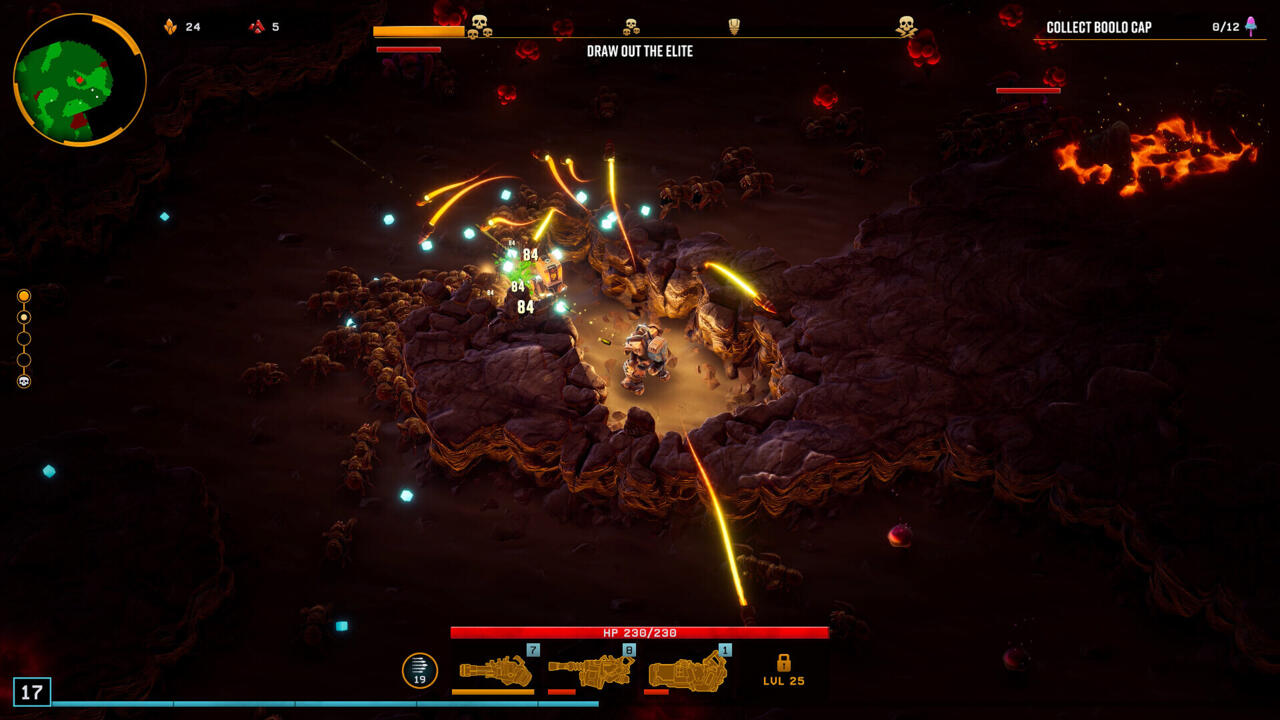Call it what you want, but the genre popularized by Vampire Survivors has become a veritable sensation, with countless attempts to capitalize on its popularity. (Seriously, the number of these–and propensity for using the word Survivor in their name–is astounding.) I’ve found and enjoyed a number of these, particularly those that introduce some kind of added wrinkle: Boneraiser Minions with its companion-based action, 20 Minutes Till Dawn’s more active combat, and the distinct classes and equipment of Death Must Die and Halls of Torment.
Deep Rock Galactic: Survivor, just recently released on PC, would appear to be yet another game to toss on the pile of Survivors-likes/auto-shooters, complete with the early-access launch and use of that all-important keyword in the title–two choices that seem non-negotiable if you’re making one of these. But where Deep Rock Galactic: Survivor could have attempted to coast on brand awareness alone, I’ve been pleasantly surprised to find perhaps the most distinct take on this style of gameplay yet. And it does that by giving you something to do other than just killing enemies.
To be clear, killing enemies is still the name of the game; like all other Vampire Survivors imitators, leveling up to upgrade your character to better slay foes–and ideally working your way into a combination of gear or perks that feels positively game-breaking–is the main focus. As in most other games of this style, your weapons automatically fire themselves, leaving you to focus on moving and positioning your character.
But this is a Deep Rock Galactic game in more than just name alone. That means that mining is a critical part of the game, and here’s where Survivor distinguishes itself. Procedurally generated caves are full of walls you can mine through, something which has numerous purposes. You can mine your way over to some resources (some used during the current run, others for permanent upgrades), create a shorter path to where you’re trying to go, or–most critically–use the tunnels you dig as a way to interact with and control the movement of enemies.
Mundane as digging might sound, that ability to reshape each stage adds a whole new level of complexity and strategy that makes the moment-to-moment action more engaging than simply positioning your character and watching your guns shoot themselves. Funneling baddies into a small opening might give you the edge you need, or redirecting a portion of them might buy you the added second you need to make a getaway. Certain enemy types can destroy walls, too, providing another factor for you to account for, creating a highly dynamic environment that requires your full attention at almost all times.

Gallery
This ability to dig also provides other risk/reward scenarios to consider. Bonus objectives to seek out certain materials, or just the greed of wanting something that can be used to buy a permanent upgrade, tempt you to risk your current run in order to take the extra time to mine some ore. Numerous times, I’ve cackled with glee as I slipped just out of reach of a tough enemy after securing some goods that put me in harm’s way. I’ve also slapped my thigh in frustration when my gamble didn’t pay off, but the exhilaration of these moments–and the ensuing satisfaction when they work out–have been more than enough to me from being discouraged.
Games like Minecraft, SteamWorld Dig, and Deep Rock Galactic have shown what fun digging through blocks can be. Because of the isometric perspective and relative size of stages in Survivor, you don’t get the same level of discovery and satisfaction here–there’s no real surprise to be had in the course of digging your way through a wall. But digging still manages to be a major boon to Survivor because of the strategic considerations it introduces.
This isn’t all that Survivor does well. There’s a very fun, wide array of weapons, including automated sentries that can be deployed by briefly stopping your movement, and a shotgun that fires in the direction you’re facing, that layer in more for you to account for. And each stage is punctuated with a 30-second timer at the end, during which you have to run to a drop pod to escape while also weighing up the urge to take a detour to do a bit of mining or grab some XP pickups you missed.
For a game said to have 6-12 months of early access ahead, I’m already delighted with what’s available to play now. I lost much of my weekend to it because the urge to do just one more run is particularly strong here. There are still improvements that will help its longevity, like a more diverse range of bosses and side objectives, and the addition of co-op could be incredible. But as it stands, Survivor has demonstrated it’s more than just yet another Survivors-like with a recognizable name slapped on it.

